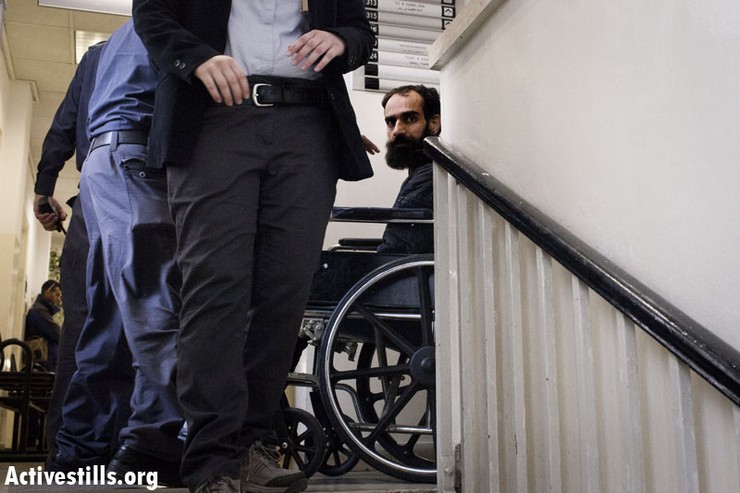Physicians are extremely worried by the deteriorating medical condition of Palestinian prisoner Samer Issawi, who has not put food in his mouth for more than half a year.

Doctors are concerned by the state of Issawi’s heart, which is weakening and losing rhythm, and are assessing that he might also be suffering from brain damage due to severe lack of minerals, in addition to partial failures of his lungs and kidneys. The Palestinian Prisoner’s Club attorney, Jawad Boulus, who visited Issawi in the Kaplan Hospital in Petah Tikva this morning, told +972 that there is a growing risk of sudden death.
Issawi, who was released in the Gilad Shalit prisoner swap and then re-arrested based on covert intelligence which the army prosecution continues to withhold from him and his lawyers, has been on hunger strike since July 29th. He has only been taking water with sugar along with intravenous food supplements. Recently, he has stopped accepting the latter in protest of the Israeli Prison Service policy of handcuffing him to his bed for 12 hours a day, which he says causes him much pain and prevents him from sleeping. Following a drastic deterioration in his condition, Issawi returned to talking mineral supplements on Tuesday morning.

On Monday, the Hebron-based Youth against Settlements group published a “Hunger Speech by Samer Issawi”, addressed to Israelis. In the message, Issawi calls upon Israelis to break free from the “military camps of the mind” and to come visit him and see “a skeleton tied to his hospital bed, and around him three exhausted jailers.”
I’m looking for an intellectual who is through shadowboxing, or talking to his face in mirrors. I want him to stare into my face and observe my coma, to wipe the gunpowder off his pen, and from his mind the sound of bullets, he will then see my features carved deep in his eyes, I’ll see him and he’ll sees me, I’ll see him nervous about the questions of the future, and he’ll see me, a ghost that stays with him and doesn’t leave…
I will die satisfied and having satisfied. I do not accept to be deported out of my homeland. I do not accept your courts and your arbitrary rule… Listen to my voice, the voice of our time and yours! Liberate yourselves of the excess of greedy power! Do not remain prisoners of military camps and the iron doors that have shut your minds! I am not waiting for a jailer to release me, I’m waiting for you to be released from my memory.
Issawi and the three other prisoners on hunger strike have been at the heart of protests and clashes in the West Bank and Jaffa. In the past couple of weeks, two Israeli women have repeatedly tried to visit Issawi at the hospital. Yesterday, after several visitations in which they could only make it to the door and say a few words before IPS guards sent them away, a curtain was placed between the door and the bed to prevent them from seeing Issawi. Following the publication of the “Hunger Speech,” several more Israeli have been trying to gain access to Issawi but have been denied by authorities. A request by Physicians for Human Rights (PHR) to send an independent doctor to examine his medical condition has been denied by IPS.

In the last couple of months, two Palestinian prisoners have died in prison. The first, Arafat Jaradat, was a young man who died during or after his interrogation. The second, Maysara Abu Hamdiyeh, died of cancer. In the latter case, PHR claims that the prisoner’s complaints to the prison doctors were not taken seriously, and criticism was also leveled at the IPS for not allowing the man an early release from prison, which would have at least made it possible for him to pass quietly athome. Both deaths sparked demonstrations throughout theWest Bank.
Related:
Watch: Social TV report on Samer Issawi, using his stomach as a weapon
Hunger-striker Samer Issawi is another statistic in an unjust legal system
As Palestinian hunger strikes come to a head, world begins to take notice

